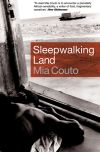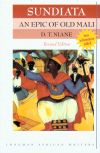Two African works reviewed by George Leonard
 |
 |
Sleepwalking Land, by Mia Couto. Translated by David Brookshaw. Serpent’s Tail (April 2006). 213pp. paperback $14.95 ISBN 185242897X Sundiata: An Epic of Old Mali, by D. T. Niane. Pearson Longman; 2nd edition (August 7, 2006). 120pp. paperback $16.00 ISBN 1405849428 Reviews by George Leonard |
I’ve been supposed to find someone to write a review of Sleepwalking Land by Mia Couto. I could write the thing myself, but the whole point of The San Francisco Humanities Review, with its ferocious Rolodex of five hundred nationally known scholars, is getting authors a hearing by an expert in their field, then letting that expert write at length. This is no one-man book blog.
But this one’s unexpectedly tough to place. I can’t even learn enough about him to figure out who would do him justice. Mia Couto isn’t even on Google! My local hardware store and bike shop are, but not an award winning African novelist. There is a “stub” on Wikipedia, the editor’s last resort, but it seems to be quoting the same PR material the publisher enclosed with the book.
The best-read Modern African lit scholar in my College only replied, “Can’t help you much. He’s important. Is along with Henri Lopes one of the two most important Lusophone [Portugese language] African Writers. Heinemann’s did publish some of his stuff before it went out of business. But he’s been slow getting a reputation in the Anglophone world.”
I asked my Africanist, quoting the material the publisher sends with the book, “This book was apparently voted ‘one of the 12 best African books of the 20th century’ by Zimbabwe Intl Book Fair. Is that a major organization?”
“Not in terms of historical precedent but this was a very important poll,” was his reply. “Took and gave great status to the winners.” “He is,” my source added, “along with Ben Okri(Nigeria), Kodjo Liang(Ghana), and Sony Labou Tansi(Zaire), a major example of African Post Modernism.”
Mia Couto, then, shouldn’t be passed over. If the SFHR had such trouble pairing him with a reviewer, the mass-market media certainly won’t bother.
I asked my source about a blurb the publishing firm’s publicist, the energetic Meryl Zegarek, had enclosed. “A white man with an African soul.” I found that kind of praise problematic after my experiences in American ethnic studies. Americans used to praise Stephen Foster that way. But my expert challenged me on it. Apparently my unconscious equation of “African” and “black” was very much out of line.
“Is this a problem for you?” he asked, plainly annoyed. “He’s native-born, raised and educated. Fought with the rebels against the Portuguese. And against the South African/US proxy army.”
So Mia Couto had earned the right to call himself African in every way a human being could — by birth, education and blood. I ended the correspondence before I had to admit I had no idea which wars my source was talking about. One can’t know everything without turning into a jack-of-all-trades, and frankly, I don’t know Mozambique history, or Portugese literature, let alone African literature written in Portugese. I’m just not a member of the “Lusophone” world.
But how many are, in America? Why, without my source, is everything useful I know about Mia Couto coming from a xerox folded into the book by its publicist? The publisher includes a scant two paragraphs printed at the front of the novel, which adds to my store of information that Couto was born in 1955, has been an important journalist — important in Mozambique, at least — and a poet.
Two paragraphs at the front, the way Penguin does for Flaubert, say. That’s fine for Flaubert. But Mia Couto isn’t Flaubert and, frankly, his country isn’t as familiar as France is to the American reader (who would probably bail out on this puzzle of a book before a dutiful book reviewer will). Even the most assigned book in English, George Orwell’s 1984, includes in the cheap Signet edition an “Afterword” by Erich Fromm, positioning Orwell for the reader.
By contrast, consider another African book that has just arrived for review: Pearson Longman’s new edition for the Longman African Writers of Sundiata: An Epic of Old Mali by D.T. Niane. It says proudly — and to my mind, significantly — in a golden starburst on the cover, “New Information Added” Before we get to Chapter 1, a helpful table of contents directs us to: “Introduction to the Revised Edition,” “Background Information,” “Who’s who of characters — glossary of places,” “Oral Tradition, Pronounciation, and Spelling,” and finally, “Preface” — fully twenty-four pages of information before we confront what would have been the intimidating first sentence “I am a griot.”
D.T. Niane has already informed us that this book is “primarily the work of an obscure griot from the village of Djeliba Koro,” and given us a two-century history of how griots evolved from “the counselors of kings” into their present African decadence: “Nowadays when we say ‘griot’ we think of those numerous guitarists who people our towns and go to sell their ‘music’ in the recording studios of Dakar or Abidjan. If today the griot is reduced to turning his musical art to account or even to working with his hands in order to live, it was not always so in ancient Africa. Formerly ‘griots’ were the counsellors of kings, they conserved the constitutions of kingdoms by memory work alone; each princely family had its griot appointed to preserve tradition; it was from among the griots that kings used to choose the tutors for young princes.” (xviii)
How exciting, for the middle-aged reader knows the word “griot” from the famous 1970s television series “Roots” and the novel it grew out of. Alex Haley claimed that the essence of it had been communicated to him by a griot before he novelized it. Reading Sundiata gives us something with which to judge the famous African-American work, which has often been accused of inauthenticity.
The translation, by David Brookshore, is graceful. The griot narrator says of his craft, “The art of eloquence has no secrets for us; without us the names of kings would vanish into oblivion, we are the memory of mankind; by the spoken word we bring to life the deeds and exploits of kings for younger generations.” (1) There are homeric catalogs: “Sundiata pronounced all the prohibitions which still obtain in relations between the tribes. To each he assigned its land, he established the rights of each people and ratified their friendships. The Kondés of the land of Do became henceforth the uncles of the imperial family of Keita, for the latter, in memory of the fruitful marriage between Naré Maghan and Sogolon, had to take a wife in Do. The Tounkaras and the Cissés became ‘banter-brothers’ of the Keitas. While the Cissés, Bérétés and Tourés were proclaimed great divines of the empire. No kin group was forgotten at Kouroukan Fougan; each had its share in the division.” (78) The book ends with another eleven pages of helpful footnotes.
Sundiata, its text only eighty-four pages long, is a painless and poetic introduction to the art of the griot and to this body of African literature in general. It not only excites one’s interest, it satisfies one’s interest. This should be the model.
Memo to Mia Couto’s publisher then: in cases like Mia Couto’s, we would like to see the kind of reference help that Pearson Longman has given us for the Sundiata.
For instance, Mia Couto is advertised as a novelist of his country’s war experience, so I’d like to know more about that. He’s billed as a “magical realist” — but how will I know what is “magic” when I don’t even know when he’s being a “realist?” Perhaps Mozambique, during wartime, really was littered with busses filled with charred bodies, like the one in which the protagonists take refuge, in Chapter One. “Look how small they ended up,” the old man remarks to the boy. “It seems fire likes to turn us into children.” (3)
In this Rashomon-like setting (that movie also springing emotionally as well as physically from post-war ruins) they find notebooks on a nearby corpse, so recent “this fellow doesn’t smell.” To say that is to have become a conoisseur of death. The old man and boy entertain themselves by reading their find. The notebooks turn out to be a kind of magical autobiography written by the dead poet they have just pulled into a mass grave, “his teeth ploughing the soil.”
Brookshore’s translation is smooth and terrifying, but I could use more editorial help evaluating it. Is Mozambique African speech so formal that a boy would really say, “It’s just that I’m aching with a sadness.” Or has Couto poeticized the speech to suit the “magical” action? When the dead poet, Kindzu, writes, “War is a snake that bites us with our own teeth,” I sense he is speaking poetry, or was in the original.
In English, however, Kindzu’s prose poetry sounds like the self-consciously poetic novels of Tom Wolfe (Look Homeward, Angel): “O Lost, and by the wind grieved, ghost come back again.” For us, it was a period style. People often talk like that in John Steinbeck, too, even in the Grapes of Wrath, at occasions like Grandpa Joad’s funeral. “Won’t be so lonely, an old man under the ground, having his name there with him.”
In Kindzu’s narrative, funerals are far more magical than that. When his drunkard father’s corpse is tossed into the waves, all the water “disappeared within an instant.” “Where there once was an expanse of blue, there was now a plain covered with palm trees. Each one was brimming with plump, shiny, tasty-looking fruit.” But does a tree “brim” with fruit? You need an object that has a brim to do that, like a cup. And how evocative, or even just euphonious, an adjective is “tasty-looking”? One feels for the translator, remembering the proverb about translating poetry, “The poetry is the part that doesn’t translate.”
Later (67) an equally magical old man passes away, declaring, “My name is in the blood of this tree now.” The “blood” of the tree? Don’t ask questions, it’s poetry. He commits suicide by putting “his finger in his ear, inserting it deeper and deeper until they hear the muffled sound of something bursting.” How deep can a finger go in an ear? It seems almost an unintentionally silly Groucho Marx kind of death. “I can’t hear you, there’s a banana in my ear.” The old man extracts his finger and his ear spurts a fountain of blood. Gradually, he wastes away until he is no more than the size of seed.” [No typos — “size of seed” not “size of a seed.”] I had pictured the shrinking puddle of blood until that metaphor changed it to a completely inappropriate image. “Seed?” Singular. But that’s not a small expanse of liquid… unless he means, and I hope he doesn’t, human seed? But then the blood has to change color, too.
Can this really be the author who, my source told me, “is along with Ben Okri (Nigeria), Kodjo Liang (Ghana), and Sony Labou Tansi (Zaire), a major example of African Post Modernism.” Not from what I’ve read. I am ready to believe that I am missing a lot here.
Let the editors and authors learn from this contrast: the Longman Sundiata should be the model, not this nearly impenetrable edition of Mia Couto. Better to risk looking scholarly but being accessible than to try to brave it through without critical apparatus.